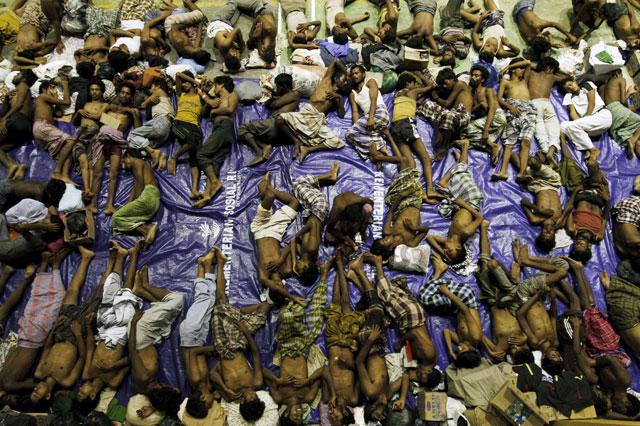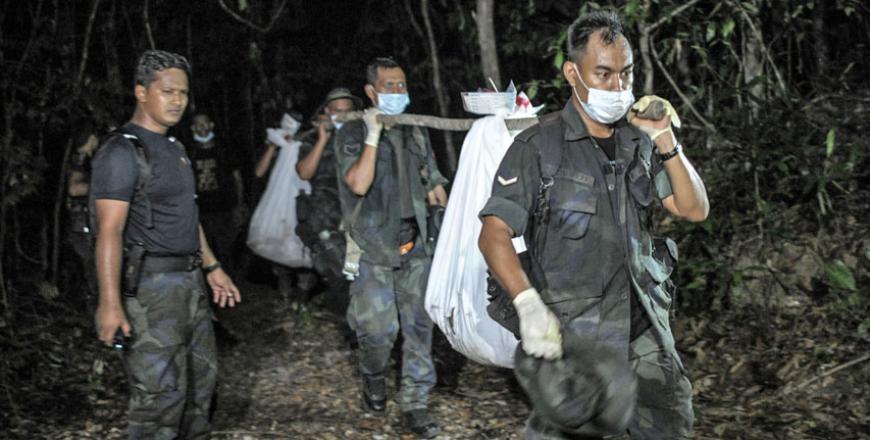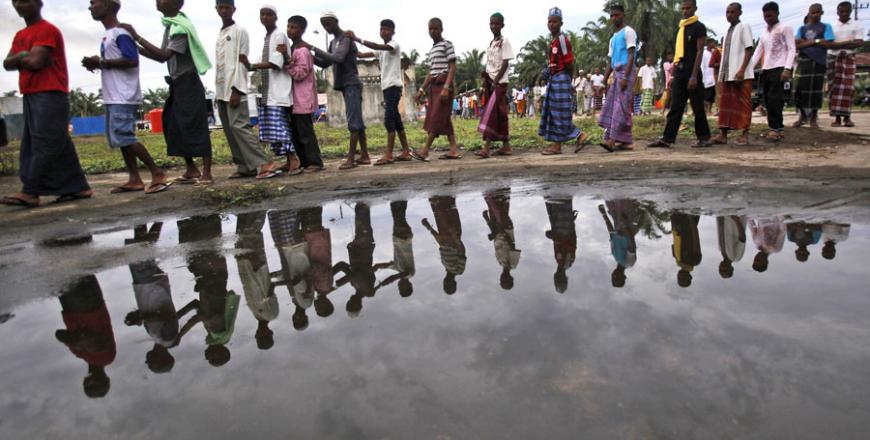You are here
Mass graves of suspected migrants found in Malaysia
By AFP - May 24,2015 - Last updated at May 24,2015

Thai police officials measure a shallow grave in Padang Besar, Songkhla province, southern Thailand, May 2 (AP photo)
ALOR SETAR, Malaysia — Malaysia said Sunday it had found mass graves feared to contain the bodies of Bangladeshi and Rohingya migrants at the centre of a regional human trafficking crisis.
Home Minister Zahid Hamidi was quoted by The Star newspaper's website as saying the graves were found near detention camps run by people traffickers.
"But we don't know how many there are. We are probably going to find more bodies," Zahid was quoted as saying.
The Star said the camps were abandoned when police found them last week.
Police in neighbouring Thailand in early May found secret human-trafficking jungle camps on their side of the border and dozens of shallow graves.
The report quoting Zahid gave few details but the Malay-language newspaper Utusan Malaysia, citing an unnamed source, earlier reported that about 30 mass graves had been found containing "hundreds of skeletons".
The Star, also quoting sources, had said the graves were "believed to contain nearly 100 Rohingya migrants".
Thailand began a crackdown on human trafficking and smuggling following the discovery of its mass graves, which appears to have thrown regional trafficking routes into chaos.
Many migrants had previously tried to enter Malaysia, their preferred destination, via its land border with Thailand.
With traffickers apparently now abandoning their human cargo at sea, boats filled with hundreds of starving migrants from the two countries have sought desperately to land in Malaysia, Thailand and Indonesia, which turned them away.
Facing growing international pressure, Malaysia and Indonesia last week said they would admit boat people, who are to be repatriated or resettled with the help of international agencies.
Indonesia launches search missions
Indonesia's military said Sunday that President Joko Widodo had ordered the country to start search and rescue operations for stranded migrant boats, an operation that began Friday.
"We will save the migrants and take them to shore," military spokesman Fuad Basya told AFP, adding that as of late Saturday, no new boats had been sighted.
Previously, Indonesian fisherman have helped hundreds of stranded Bangladeshis and Rohingya to shore.
The Malaysian government announced Thursday that its navy and coastguard would also be mobilised for searches but so far it has not reported any rescues.
Widodo on Sunday indicated that Jakarta would need international help footing the bill for housing thousands of destitute people.
More than 3,500 migrants have swum to shore or been rescued off the coasts of Malaysia, Indonesia, Thailand and Bangladesh since the crisis erupted earlier this month.
Malaysian media said the latest mass graves were found near Padang Besar and Wang Kelian, two towns along the Thai border in the Malaysian state of Perlis.
Police declined to release information but the national police chief will hold a press conference on Monday.
Malaysia's government had previously denied that any such mass graves or slave camps existed on its soil.
"I am shocked!" Zahid was quoted by The Star as saying.
He added that some of the camps may have been there for as long as five years, and that Malaysian citizens were suspected to have been involved.
Most Bangladeshis are economic migrants seeking to escape poverty at home. Prime Minister Sheikh Hasina called Sunday for strict action against both migrants and traffickers.
The Rohingya leave Myanmar in large part to escape discriminatory treatment from the Buddhist majority.
Rights groups said a new population law further targets persecuted Rohingya Muslims, by allowing Myanmar's regional governments to introduce family planning regulations to reduce birthrates in their states.
"This will seriously worsen ethnic and religious tensions. We fully expect that the Muslim Rohingya in Rakhine state will be target number one of this legislation," said Human Rights Watch Deputy Asia Director Phil Robertson.
Myanmar insists the Rohingya are illegal immigrants from Bangladesh and denies citizenship to most of them. But it has faced increasing international pressure to stem the flood of people from its shores.
On Friday its navy said it had carried out its first rescue of a migrant boat, involving 208 men crammed in a wooden fishing vessel. Most were Bangladeshis, according to Myanmar officials.
However, possibly thousands more are thought still to be at sea.
Related Articles
Nearly 2,000 boat people from Myanmar and Bangladesh have been rescued or swam to shore in Malaysia and Indonesia, authorities said Monday, warning that still more desperate migrants could be in peril at sea.
WANG KELIAN, Malaysia — Malaysian police Thursday removed the remains of nine people from jungle camps near the Thai border where an estimat
Malaysia has found 139 graves, and signs of torture, in more than two dozen squalid human trafficking camps suspected to have been used by gangs smuggling migrants across the border with Thailand, the country's police chief said on Monday.














